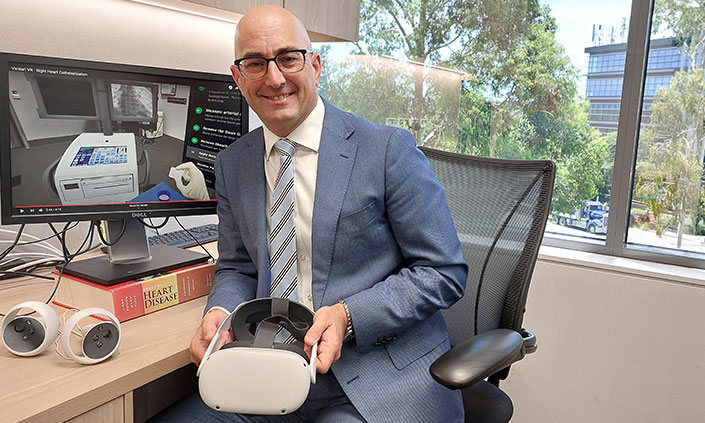Macquarie VR heart diagnostic goes global
A virtual reality (VR) training program developed by a Macquarie University Hospital cardiologist is now being used by 28 universities and hospitals.

RHC is used by cardiologists, anaesthetists, intensivists and occasionally emergency physicians for patients with suspected heart failure, cardiogenic shock and pulmonary hypertension, and for patients preparing to undergo cardiothoracic surgery.
It is used to assess pulmonary artery pressures, right- and left-side heart pressures and function, cardiac output, fluid status, and can also be used to evaluate the haemodynamic response to exercise.
Associate Professor Martin Brown, a cardiologist who specialises in advanced heart failure and pulmonary hypertension, developed the virtual training in collaboration with health technology company Vantari VR.
The VR training is delivered via laptop and VR headset, allowing clinicians to learn to perform an RHC from anywhere in the world. A trainer guides them through virtual procedures according to best practice guidelines, and they can practise as many times as needed to master it.
Tracking performance in real-time and providing physical feedback helps collect user data, which can then be displayed in the learning system.
At the end of each exercise, trainees receive a comprehensive assessment, including failed steps and a proficiency score.
The training is now one of 20 programs in a VR suite for doctors that Vantari VR distributes worldwide.
So far, 12 public and private hospitals and two universities in Australia are using the RHC training, along with 12 institutions in the US, and one each in the UK and Israel. In the US, the institutions include Yale and McGill universities, and Johns Hopkins, Mount Sinai West, and Harvard BIDMC hospitals.
Associate Professor Brown says that even though the restrictions of lockdown are in the past, VR training remains valuable.
“I perform about 100 of these a year, but doctors may find they have limited opportunities to observe or perform an RHC in person unless they work at a hospital that specialises in heart failure, pulmonary hypertension or heart/lung transplantation,” he says.
“It can be challenging to perform correctly to ensure accuracy, and clinicians also need a comprehensive understanding of the measurements if they are to correctly interpret the results.
“Our VR training improves doctors’ performance, and has been shown to reduce error rates by 40 to 50 per cent, as well as the time it takes to complete procedure by 50 per cent.
“Analysis shows that it improves safety and patient outcomes, cutting medical error complications and malpractice, with reduced risks to patients and costs to institutions.
“There is great potential here for extending training opportunities in regional and remote hospitals, where doctors are often expected to work alone and across a number of areas, yet have little opportunity to travel to major hospitals or universities for training.”
In addition to the virtual training, Associate Professor Brown runs regular in-person training days in Macquarie Medical School’s simulation lab, drawing doctors from around the country.